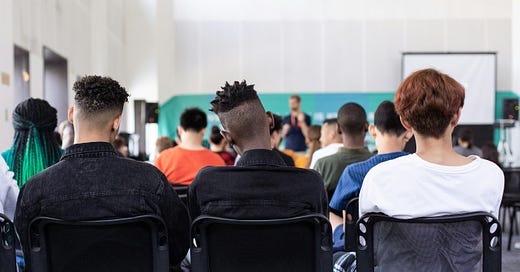I’ve been talking to self-directed teenagers. Teenagers who have been allowed to retain control for their learning – meaning that no one has said ‘You must learn this’ or ‘If you don’t learn this, you’ll be in trouble’. Teenagers who can choose what they learn and how they learn it.
Some of them have never been to school, but most of them have been to a bit of school. In most cases they left because they were so unhappy there that it was clear that it wasn’t working. Some of them had developed serious symptoms whilst at school. Eating disorders, depression and severe anxiety. Most of them identified as neurodivergent.
They told me about how they learnt things and something stood out for me from all their stories.
They all saw themselves as the active agent in their learning. They were the person who makes things happen – with help from others, but ultimately, by deciding that they wanted to learn. They would get interested in something, seek out resources, and start learning. They saw no need to wait for a teacher or a course to start. They told me about learning languages, creative writing, maths, music, needle-felting, sewing, video-editing, history and drama. Their learning was for them, not for anyone else.
They told me about knowing that they would need to learn some things if they wanted a particular future, and so they’d have to learn it now, even if that wasn’t their preference. They still did that for themselves. Their parents were not making them practise things. They practiced because they wanted to get better at doing things. They could quit if they wanted to – and several of them had quit things.
When I asked them what helped their learning, the majority of them talking about agency. They said things like ‘If I’m made to do it, it’s much harder’. Or ‘I can do difficult things when I choose, but if someone tells me there’s no choice, then I can’t’. One of them said that the only place he felt he learnt nothing was in his mandatory Maths GCSE resit class. ‘It’s grey’ he said. ‘No one wants to be there’.
Some of them had taken (and passed) GCSEs entirely independently, whilst others had gone to college or had tutors. Some hadn’t done GCSEs at all and had plans to take a different route. Some had failed a GCSE and were retaking. All of them saw themselves as people who were doing things, who were living their life and who had a future.
And that’s what I see as the goal when teenagers stop going to school. Not to get them back ‘on-track’ if that track was the wrong one for them. Not to go through the motions of replicating school. Not to make sure they take GCSEs at the same time as their peers.
The goal is to help them retrieve their sense of themselves as the person in the driving seat of their life, which often seems to get lost in the passage through the school system. To regain their sense of being a person whose choices matter, and who is capable of learning. That might include college or a return to school, or it might not. The important thing is that their voice matters.
For when that can be heard, then the future becomes possible.
I’m talking more about this in a new webinar on March 10th about helping teens recover from school. This one is about learning and how to help your teen start learning again after school has gone wrong.





As the parent, the most difficult parts are recognizing the value in my kid’s process (journey, not destination!), and giving time for school trauma recovery first.
It’s been a learning process, as a parent, letting my teens take the lead and discover their passions. I’ve watched them flounder and flip flop about, but I’ve also had the privilege of seeing them excel when given the chance to truly be themselves and follow their own journeys. 💙